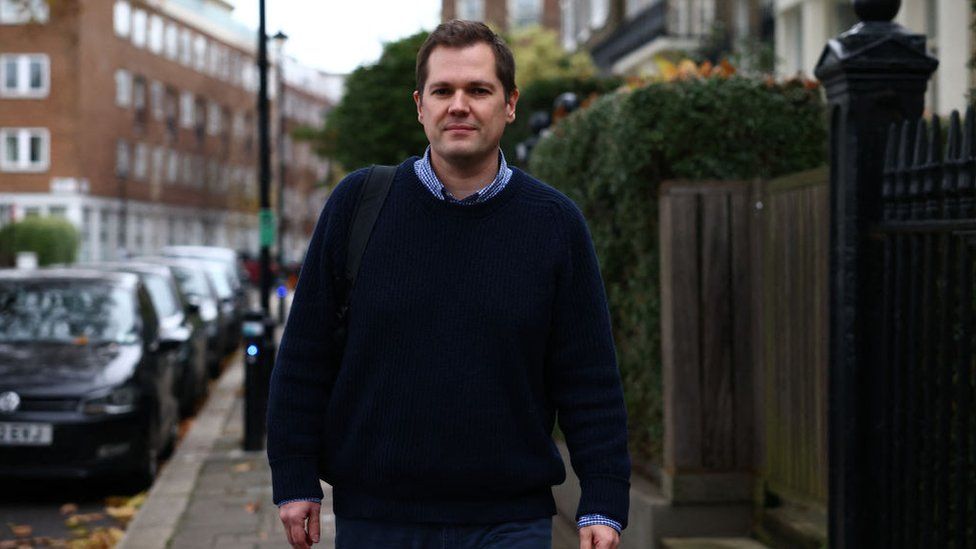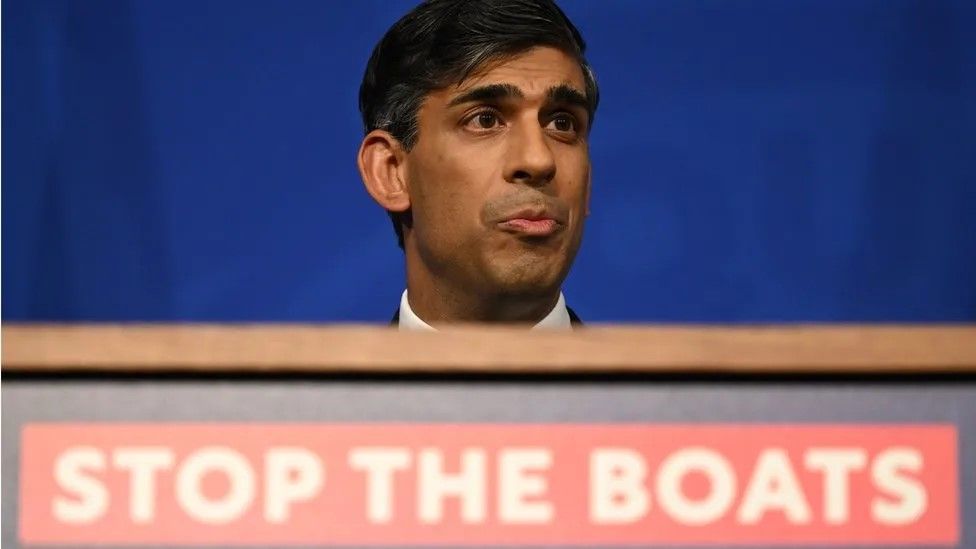The former immigration minister speaks for the first time since he resigned saying the policy wasn’t being tough enough.
 Image source, Getty Images
Image source, Getty ImagesFormer immigration minister Robert Jenrick has said the government’s latest proposal to ensure it can send asylum seekers to Rwanda will fail to end the “merry-go-round” of the scheme getting caught up in legal issues.
Mr Jenrick aired his views in a Daily Telegraph editorial, his first public comment since resigning.
He resigned on Wednesday over his lack of faith in the legislation.
The government will hold a vote on the proposed legislation on Tuesday.
Prime Minister Rishi Sunak has called on MPs to support it, arguing that the new bill is the “only approach” that would successfully prevent further legal challenges stopping flights carrying asylum seekers taking off to Rwanda.
But while some MPs think the legislation is too tough, others share Mr Jenrick’s view that it does not go far enough.
In his opinion piece, the former immigration minister said the test of the Rwanda legislation was whether it could “end the merry-go-round of legal challenges” that prevented the removal of asylum seekers who have entered the UK illegally after crossing the English Channel in small boats.
“Having done as much as I could to strengthen the legislation, I concluded, regrettably, the answer is no,” he wrote, adding the issue forced his resignation.
The government has always seen the policy as a key tactic to provide a deterrent to the many thousands of people who attempt to make the perilous journey. In the first nine months of 2023, a total of 24,830 have arrived in this way, after 45,774 did so in the whole of 2022.
Mr Jenrick said it was his view that border control would be “far more straightforward if we [the UK] extricated ourselves from the web of international frameworks that have taken on near mythical status within government”.
“One of the advantages of our uncodified constitution is the unfettered power of our sovereign parliament to create law,” he added.
He claimed those who opposed the Rwanda plan, and a tough cut in net migration in general, held “flawed assumptions about the cultural benefits of mass immigration”.
Politicians on the right have a choice looming, Mr Jenrick said:, adding “Begin to deliver on the mainstream concerns of ordinary people when it comes to immigration, or face their red-hot fury at the ballot box”.

Image source, PA Media
Following Mr Jenrick’s resignation last week, Mr Sunak called a news conference to state his confidence in the bill.
He insisted the legislation was the “toughest immigration law ever”, that only allowed for individual legal challenges if the small boat arrival can prove “with credible and compelling evidence” they have a “real and imminent risk of serious and irreversible harm”.
“Going any further would mean that Rwanda would collapse the scheme and then we’ll have nowhere to send anyone to – and that is not the way to get this going,” Mr Sunak added.
In his editorial, Mr Jenrick said that allowing such challenges invites asylum seekers to “concoct a reason to delay their removal”.
“The small-boat-chasing law firms will gladly assist them in this endeavour,” he wrote.
Mr Jenrick, and those who share his views, want the bill to prevent the possibility of such legal challenges under domestic and international human rights laws.
The bill that will be put to parliament this week compels judges to treat Rwanda as a safe country and gives ministers the powers to disregard sections of the Human Rights Act.
It follows the signing of a treaty between the UK and Rwanda that the British government says ensures that people relocated to Rwanda are not at risk of being returned to a country where their life or freedom would be threatened.
The Liberal Democrats have called for Mr Sunak to be investigated over a £100m payment to Rwanda, which the party argues breaches the ministerial code. because it was not publicly declared for eight months.
“The public deserves transparency, not hushed-up backroom dealings. We need an urgent inquiry to get to the bottom of this,” MP Christine Jardine said.
The Rwanda scheme – which was first announced by former Prime Minister Boris Johnson in April 2022 – has been repeatedly delayed by legal challenges and was found to be illegal by the UK Supreme Court in November.
Labour has also pledged to scrap the policy if it wins the next election and pursue a policy of greater border security.
In his editorial, Mr Jenrick described the Labour policy as a “laughable” way to address “one of the great challenges of the 21st Century”.